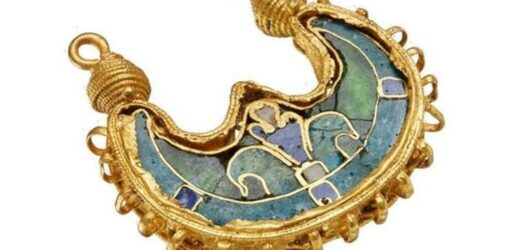Archaeologists stunned by 'significant' burial found in UK pit
We use your sign-up to provide content in ways you’ve consented to and to improve our understanding of you. This may include adverts from us and 3rd parties based on our understanding. You can unsubscribe at any time. More info
The National Museum of Denmark has announced that a rare 11th-century golden earring has been uncovered. This rare piece of jewellery was found in a field in West Jutland, Denmark, by Frants Fugl Vestergaard, with the help of a metal detector.
According to the National Museum, this gold earring is likely from the Middle East and is the first discovery of such an object in Scandinavia.
The Copenhagen museum believes that the earring originated in Byzantium or Egypt and is likely a gift from the emperor of Byzantium to a Viking chieftain.
Another explanation that was put forward was that the emperor of Byzantium had given the earring to a Danish Viking who was his bodyguard.
This gold piece, which was added to the museum display on Monday, is extremely rare as only a handful of similar artefacts have been found across the world.


Museum expert Peter Pentz said: “It is completely unique for us.
“We know of only 10 to 12 other specimens worldwide and we have never found one in Scandinavia.”
According to Mr Pentz, while the Vikings bought back thousands of silver coins from their forays, travels and trading expeditions, it was rare to find jewellery among their loot.
The site of the discovery in West Jutland surprised experts, as there was no known Viking site nearby.

There have been other instances where gold from Byzantium was found as burial objects in Viking graves.
The earring consists of a crescent-shaped gold plate and is inlaid with enamel in a frame of gold threads that is decorated with small gold balls and gold bands.
The motif on the gold plate depicts two stylized birds around a plant, which symbolizes the tree of life.
For Mr Vestergaard, this discovery was a dream.
DON’T MISS:
Inmates take swift revenge on tragic Arthur’s ‘evil’ stepmother [INSIGHT]
Angela Rayner sets up new crack team [REPORT]
Scotland POLL: Should UK hand Nicola Sturgeon and SNP £4.6billion? [POLL]

According to the National Museum, this gold earring is likely from the Middle East and is the first discovery of such an object in Scandinavia.
The Copenhagen museum believes that the earring originated in Byzantium or Egypt and is likely a gift from the emperor of Byzantium to a Viking chieftain.
Another explanation that was put forward was that the emperor of Byzantium had given the earring to a Danish Viking who was his bodyguard.
This gold piece, which was added to the museum display on Monday, is extremely rare as only a handful of similar artefacts have been found across the world.

The Dagmar cross was found in 1683 in one of the royal tombs in St. Bendt’s Church in Ringsted.
Mr Prentz said: “In quality, the enamel on the earring is not quite as good as the Dagmark cross.”
“But where the Dagmar cross has been found in a queen’s grave, where context lends itself, the earring has been found without context in a field in West Jutland.”
Source: Read Full Article


